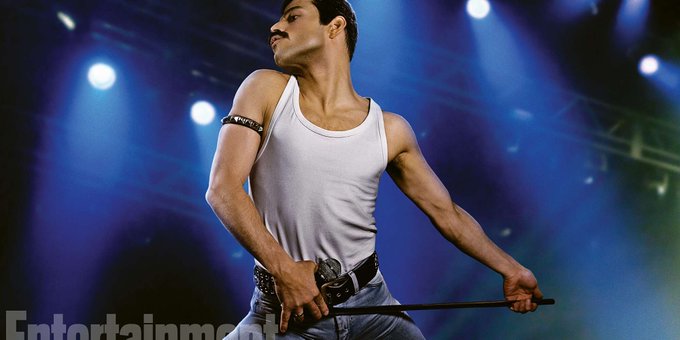Pathbreakers of Arab America—First in a Series: Rami Malek

By: John Mason / Arab America Contributing Writer
This is the first in Arab America’s series on American pathbreakers of Arab descent. The series will include personalities from entertainment, business, science, academia, and politics, among other areas. We will endeavor to represent the broad array of Arab Americans, including a mix of females and males, countries of origin, and fields of endeavor. Our first pathbreaker case is the illustrious American-born Arab American actor Rami Malek.
Rami Malek—Renown American Actor, Proud of his Egyptian roots
Rami Said Malek was born in Torrance, California in 1981. His Egyptian parents immigrated to California, propelled by Rami’s father’s quest for work. His father had been a travel agent and tour guide in Egypt and was intrigued by Western visitors. Rami grew up close to his Egyptian roots, insisting:
“There’s no first-generation, or second-generation removed. I am Egyptian. I grew up listening to Egyptian music. I loved Umm Kulthum. I loved Omar Sharif. These are my people. I feel so gorgeously tied to the culture and the human beings that exist there. I acknowledge that I have a different experience, but I am so enamored and intertwined with Egyptian culture. It is the fabric of who I am.“
Rami’s acting accomplishments
Rami is known for many roles in American TV series and films. He is especially known for his role as Queen, lead singer Freddie Mercury in the biopic Bohemian Rhapsody. Rami is the first actor of Egyptian heritage to win the Academy Award for Best Actor. In 2019, he was named by Time magazine as one of the 100 most influential people in the world.

Even following a four-year university studies program in theater, Rami had an initial period of difficulty in locating work. Once the offers started coming in, however, the TV roles started rolling in, followed by supporting, then major film acting roles. In 2015, a major breakthrough occurred, Rami being hired over 100 other actors to play in the TV psychological drama, Mr. Robot. This became known as his “breakout performance.”
It was Malek’s portrayal of Freddie Mercury in Bohemian Rhapsody that put him in the Hollywood stratosphere of stars. The film became a major box office success, one of the sixth highest-grossing films of 2018, and one of the highest-grossing musical biofilms of all time. Rami garnered the Golden Globe for Best Actor in a Motion Picture Drama, the Screen Actors Guild Award for Outstanding Performance by a Male Actor in a Leading Role, the BAFTA Award for Best Actor in a Leading Role, and the Academy Award for Best Actor.
Malek put lots of work into learning his role of Mercury. He even moved to London to work with a dialect coach and a body movement coach and took piano and singing lessons. His training included watching the 1985 Live Aid concert video in an effort to mimic Mercury’s speaking, his falsetto singing voice, and his overbite. Queen’s musicians were so impressed with Rami’s performance that they sometimes forgot he was Rami. His future is as bright as the brightest star in the heavens.

Hollywood, Arab ethnicity and religion
Malek noted as he was accessing Hollywood, People didn’t know where to place me with my ethnicity, and never was I ever up for leading anything. The fact that Rami Malek got to play the lead character, called Elliot Alderson, in Mr. Robot was somewhat of a coup, I think. I never saw that possibility when I was younger. He noted that when he was preparing for auditions, he would do so as if he was actually going to perform. Rami is noted for large eyes, some say oversized, prompting actor Tom Hanks to say, “This guy’s got haunting eyes.”
Malek was the first actor of Egyptian and Coptic religious heritage to win the Academy Award for Best Actor. He was celebrated in Egypt by the media and some government officials, but one Member of Parliament judged the win on grounds of Rami’s portrayal of a homosexual. That member even suggested that the Academy Award aimed to “corrupt morality in the Arab world.”
Until recently, Arabs have been portrayed in negative, stereotypical characters. As Al-Jazeera writer and law professor Khaled Beydoun noted, in the context of Malek’s success, “Narrow conceptions and caricatures of Arab identity are deeply rooted in Hollywood. The hijacker and the terrorist, the opulently wealthy oil sheik, and the oppressed and over-dressed woman, among others, comprise the most prominent depictions of Arab identity in film and television. While marking a milestone moment for Arab or Egyptian Americans in Hollywood, Malek’s (TV series) victory transcended the four corners of the television screen by challenging the flat conceptions of how America understands identities originating from the Arab World.”
In a final note on ethnicity and religion, some resisted the labeling of Rami’s “Arab American” Oscar win, insisting that his parents are Coptic Egyptians. This reflects a deep-rooted historical dispute that has crossed the seas to America from Egypt, a tug-of-war between Arab and Coptic nationalists.
Regardless of these arguments, Rami Malek has made both Arab American and Egyptian American history with his own personal victory.
Sources:
–“List of Arab Americans,” Wikipedia—the free encyclopedia, 2023
–“Rami Malek: An Arab in Hollywood?” Al-Jazeera, by Khaled A Beydoun, 9/22/2016
John Mason, PhD., who focuses on Arab culture, society, and history, is the author of LEFT-HANDED IN AN ISLAMIC WORLD: An Anthropologist’s Journey into the Middle East, New Academia Publishing, 2017. He has taught at the University of Libya, Benghazi, Rennselaer Polytechnic Institute in New York, and the American University in Cairo; John served with the United Nations in Tripoli, Libya, and consulted extensively on socioeconomic and political development for USAID and the World Bank in 65 countries.
Check out our Blog here!








